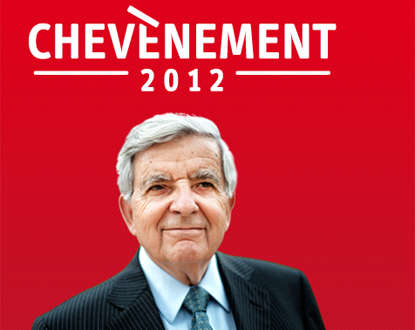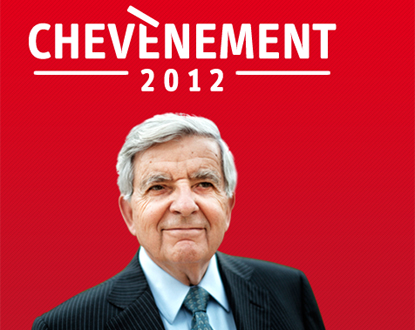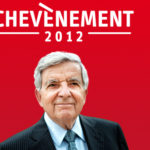It is a presidential candidate’s coat that Jean-Pierre Chevènement came to Nice for a meeting with his movement’s activists and the press. The politician, who will undoubtedly challenge the socialist candidate François Hollande due to his position on the political spectrum and his uncompromising ideas, has presented his book-manifesto titled “Getting France Out of the Deadlock”.
 After having provided a critical analysis of the directions taken by our country over the past thirty years in “Has France Finished?”, the 2011 best political book award winner, Jean-Pierre Chevènement published a book-manifesto titled “Getting France Out of the Deadlock”.
After having provided a critical analysis of the directions taken by our country over the past thirty years in “Has France Finished?”, the 2011 best political book award winner, Jean-Pierre Chevènement published a book-manifesto titled “Getting France Out of the Deadlock”.
Ladislas Polski, departmental secretary of the MRC, declares his unwavering commitment to the future electoral contest:
“Today, the foundations of the economic and financial system on which our country and the European Union rest are shaken with tremors, which we observed in Alpes-Maritimes during the G20, from the front row.
In this context, the future President of the Republic will have to demonstrate his ability to conduct an in-depth analysis of our country’s situation and propose a long-term vision for France.
Now more than ever, Jean-Pierre Chevènement’s proposals, advocating for a profound reorientation of European construction and regulation of global financial capitalism, are timely, and the Alpes-Maritimes Federation of the MRC is “battle-ready” to defend them during the crucial 2012 electoral deadlines”.
Jean-Pierre Chevènement, in Frangy-en-Bresse, in 2010.
AFP/JEFF PACHOUD
Of course, they would have preferred to do without it. But, if they must deal with it, they will not let it bother them. This is the prevailing sentiment at the Socialist Party following the confirmation, Saturday, November 5 on France 2, of Jean-Pierre Chevènement’s candidacy for the presidential election.
The senator from Belfort’s Elysee ambitions stir little passionate reactions at the PS, primarily because they hardly come as a surprise. During its 5th congress on June 27, 2010, the Republican and Citizen Movement (MRC) had already proposed that its honorary president run for the 2012 presidential election. On May 4, 2011, the person himself indicated that his candidacy was likely, specifying that he would “formalize” it in the autumn.
Yet for several weeks, various signs indicated this formalization was imminent: the multiplication of posters labeled “Chevènement 2012”, and the release of a new book – the second in nine months – with a title as captivating as an election program: Getting France Out of the Deadlock (Fayard, 168 p., 12 euros).
BITTERNESS TOWARDS THE PS
Expected, Jean-Pierre Chevènement’s candidacy was all the more so as he had recently not hidden his bitterness towards the PS. Although he likely didn’t believe much in his chances of becoming Senate President following the left’s victory in the September 25 elections, he at least hoped to chair the foreign affairs and defense committee. He had to settle for the vice presidency.
“As always, Chevènement based his decision on his deep convictions and his personal situation. His conviction is that he has a role to play to prevent the left from being ‘Eurofanatic’. His personal situation is that of a 72-year-old man who cannot stand being treated like an old fool by the PS at a time when history gives strength to his analyses,” a socialist deputy deciphers.
Thus, Jean-Pierre Chevènement’s candidacy does not surprise the socialists, but it does not please them either. “He made a choice that was not necessarily the one we would have wished,” concedes Pierre Moscovici.
However, the deputy from Doubs and probable future campaign director for François Hollande refrains from using too harsh words because he hopes that a withdrawal is still possible: “To put an end to Sarkozyism, the left must be as united as possible, starting from the first round. By running, Jean-Pierre Chevènement therefore assumes a particular responsibility. It is up to him to reflect on this responsibility and to us to help him reflect,” explains Mr. Moscovici.
“NO PLACE FOR HIM”
The same sentiment is shared in the PS’s left wing: “Jean-Pierre has the absolute right to weigh in on the debate. But if he goes all the way, then he must know that he risks endangering the left. With a Marine Le Pen who will probably get around 20% of the votes in the first round, there is no room for a candidacy like his,” warns Henri Emmanuelli.
In entering the race to the Elysee, does Jean-Pierre Chevènement weaken François Hollande, as he had weakened Lionel Jospin by running in 2002, to the point of being accused in hindsight of contributing to Jospin’s elimination in the first round?
For Gérard Le Gall, who at the time advised Mr. Jospin on public opinion issues, and who today does the same work with Mr. Hollande, the parallel is tenuous. “In 2002, Chevènement was in a completely different frame of mind: by speaking of “Chirpin” and “Josrac”, he lumped the prime minister and the president together. Today, he wants to act as a spur to Hollande, not an opponent. And he can be very useful in the fight against Sarkozy,” estimates Mr. Le Gall.
“HE HAS MARGINALIZED HIMSELF”
If Mr. Chevènement does not overly worry the socialists, it is also because his capacity for nuisance appears less than in 2002. “At the time, Chevènement occupied an important place on the political scene: he had been Minister of the Interior for three years and he was spoken of as the “miracle man of the Republic” after the anesthesia accident he suffered in 1998. Since then, even if the situation is more favorable to his ideas, he has aged and marginalized himself,” analyzes historian Alain Bergounioux.
Convinced that his candidacy weakens Jean-Luc Mélenchon more than François Hollande, socialists do not want to minimize its consequences. “Arithmetically, it is not the 2% or 3% he will gather that will weaken Hollande. But politically, it’s not a good sign: first because it links Hollande to his past as a Jacques Delors heir on Europe; secondly because it gives an image of division that breaks the gathering momentum created by the primary,” estimates Paris senator Marie-Noëlle Lienemann.
Like her, representatives of the PS’s left wing however believe that Mr. Chevènement can influence Mr. Hollande’s line. “If Hollande takes on some of Chevènement’s ideas, his candidacy will be unnecessary,” Arnaud Montebourg hopes.
by Thomas Wieder



